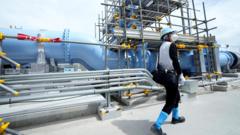The shift towards nuclear energy represents a complex balancing act for Japan's government, which seeks energy independence and carbon reduction in the face of external geopolitical influences and escalating domestic energy demands. In this context, Daishiro Yamagiwa, a member of parliament, emphasized the necessity of nuclear energy, citing challenges in sourcing fossil fuels amid ongoing global conflicts.
Professionals like Professor Kenichi Oshima express skepticism, arguing that increasing nuclear reliance could exacerbate risks of catastrophic incidents. The haunting memories of the Fukushima Daiichi disaster—a tragedy that left a long-lasting impact on public perception of nuclear energy—still resonate, making citizens like Tokyo resident Yuko Maruyama apprehensive about endorsing increased nuclear usage.
Opposition has emerged from environmental groups such as Greenpeace, which condemned the renewed focus on nuclear energy as irresponsible, especially given the enduring toxic legacy of the Fukushima disaster. Despite these resistance dynamics, the government needs to revive and upgrade a considerable number of nuclear reactors to achieve its ambitious energy goals, while also addressing public sentiment and safety concerns tied to past nuclear incidents.
With the implementation of the energy plan awaiting parliamentary approval, the road ahead for Japan's energy strategy remains fraught with challenges, illustrating a nation caught between the demands for energy security and the memories of a catastrophic past.
Professionals like Professor Kenichi Oshima express skepticism, arguing that increasing nuclear reliance could exacerbate risks of catastrophic incidents. The haunting memories of the Fukushima Daiichi disaster—a tragedy that left a long-lasting impact on public perception of nuclear energy—still resonate, making citizens like Tokyo resident Yuko Maruyama apprehensive about endorsing increased nuclear usage.
Opposition has emerged from environmental groups such as Greenpeace, which condemned the renewed focus on nuclear energy as irresponsible, especially given the enduring toxic legacy of the Fukushima disaster. Despite these resistance dynamics, the government needs to revive and upgrade a considerable number of nuclear reactors to achieve its ambitious energy goals, while also addressing public sentiment and safety concerns tied to past nuclear incidents.
With the implementation of the energy plan awaiting parliamentary approval, the road ahead for Japan's energy strategy remains fraught with challenges, illustrating a nation caught between the demands for energy security and the memories of a catastrophic past.



















